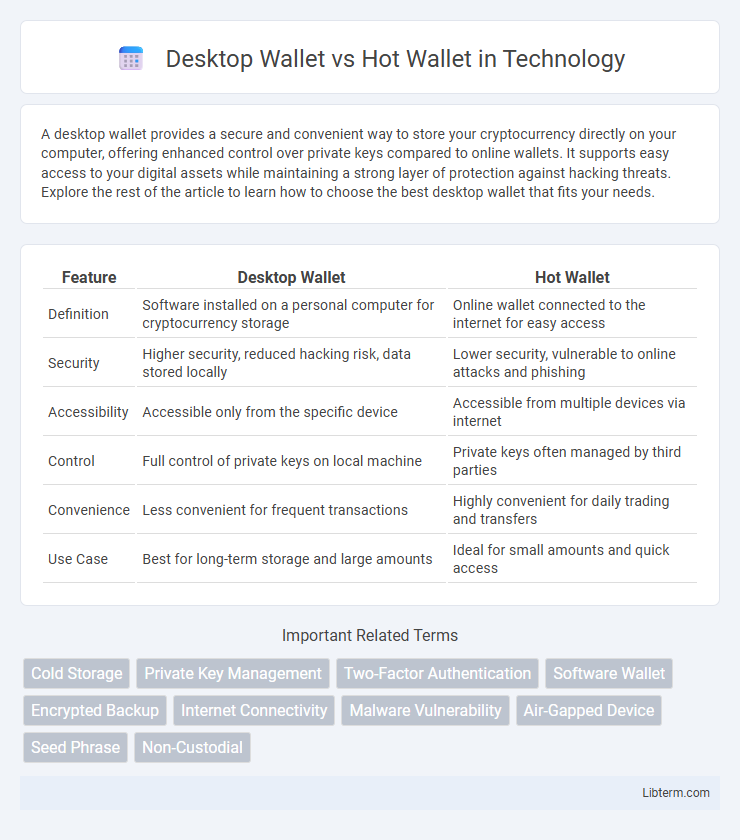A desktop wallet provides a secure and convenient way to store your cryptocurrency directly on your computer, offering enhanced control over private keys compared to online wallets. It supports easy access to your digital assets while maintaining a strong layer of protection against hacking threats. Explore the rest of the article to learn how to choose the best desktop wallet that fits your needs.
Table of Comparison
| Feature | Desktop Wallet | Hot Wallet |
|---|---|---|
| Definition | Software installed on a personal computer for cryptocurrency storage | Online wallet connected to the internet for easy access |
| Security | Higher security, reduced hacking risk, data stored locally | Lower security, vulnerable to online attacks and phishing |
| Accessibility | Accessible only from the specific device | Accessible from multiple devices via internet |
| Control | Full control of private keys on local machine | Private keys often managed by third parties |
| Convenience | Less convenient for frequent transactions | Highly convenient for daily trading and transfers |
| Use Case | Best for long-term storage and large amounts | Ideal for small amounts and quick access |
Introduction to Cryptocurrency Wallets
Cryptocurrency wallets store private keys essential for managing digital assets, with desktop wallets offering enhanced security by operating locally on a personal computer, reducing exposure to online threats. Hot wallets, accessible via internet-connected devices, provide greater convenience and quick access for frequent transactions but pose increased vulnerability to hacking. Selecting between desktop wallets and hot wallets depends on balancing security needs and transaction frequency in cryptocurrency management.
Understanding Desktop Wallets
Desktop wallets store cryptocurrency private keys locally on a personal computer, providing enhanced security compared to hot wallets that operate online and are more susceptible to hacking. They enable users to maintain full control over their funds without relying on third-party services, reducing risk from centralized attacks. Regular software updates and secure computer environments are essential to protecting desktop wallets against malware and unauthorized access.
What Are Hot Wallets?
Hot wallets are digital cryptocurrency wallets connected to the internet, enabling quick and easy access for frequent trading and transactions. Unlike desktop wallets stored locally on a specific device, hot wallets provide real-time synchronization across multiple platforms, offering convenience at the expense of higher security risks. Common examples of hot wallets include mobile wallets, web wallets, and browser extensions, which prioritize user accessibility over offline storage safety.
Security Features: Desktop vs Hot Wallet
Desktop wallets offer enhanced security by storing private keys locally on the user's computer, reducing exposure to online threats and hacking risks compared to hot wallets, which are connected to the internet. Hot wallets, while more convenient for frequent transactions, face higher vulnerability to malware, phishing attacks, and server breaches due to constant internet connectivity. Implementing strong encryption, multi-factor authentication, and regular software updates are critical for both wallet types to maintain optimal security.
Accessibility and Convenience
Desktop wallets offer enhanced security by storing private keys locally on a computer but require installation and regular updates, which may limit accessibility for users on multiple devices. Hot wallets, connected to the internet via web or mobile platforms, provide greater convenience with instant access and seamless transactions but are more vulnerable to cyber threats. Users prioritize desktop wallets for secure, stationary use, while hot wallets maximize accessibility and ease of use for frequent, on-the-go transactions.
Supported Cryptocurrencies
Desktop wallets generally support a wider range of cryptocurrencies, including Bitcoin, Ethereum, Litecoin, and various ERC-20 tokens, due to their ability to integrate with multiple blockchain networks. Hot wallets, typically connected to the internet and often used on mobile or web platforms, support popular cryptocurrencies like Bitcoin, Ethereum, and Binance Coin but may have limited compatibility with lesser-known or niche tokens. The choice between desktop and hot wallets should consider the breadth of supported cryptocurrencies to ensure compatibility with the user's portfolio.
Backup and Recovery Options
Desktop wallets offer robust backup and recovery options by allowing users to securely store private keys and wallet files locally, often with encrypted backups and mnemonic seed phrases that facilitate full restoration in case of device failure. Hot wallets, while convenient for quick access, generally rely on cloud storage or less secure backup methods, increasing vulnerability to hacking and data loss without strong recovery protocols. Choosing desktop wallets enhances control over backup processes, reducing risks associated with online exposure and ensuring more reliable recovery options during emergencies.
User Experience and Interface
Desktop wallets offer a robust user experience with full control over private keys and advanced security features but require software installation and regular updates, which may be challenging for beginners. Hot wallets prioritize convenience with web or mobile interfaces, enabling quick access and seamless transactions but pose higher security risks due to constant internet connectivity. The interface of desktop wallets tends to be feature-rich and customizable, while hot wallets emphasize simplicity and speed, catering to everyday users needing easy access to funds.
Pros and Cons Comparison
Desktop wallets offer enhanced security by storing private keys locally on a user's computer, reducing exposure to online threats, but they can be vulnerable to malware or device failure. Hot wallets provide seamless access and convenience for frequent transactions through internet connectivity, yet they carry higher risks of hacking and theft due to constant online exposure. Choosing between desktop and hot wallets depends on balancing security needs with ease of use for managing cryptocurrency funds.
Choosing the Right Wallet for Your Needs
Desktop wallets offer enhanced security by storing private keys locally on your computer, making them ideal for users prioritizing control and offline safety. Hot wallets, connected to the internet, provide convenience and quick access for frequent transactions but carry higher vulnerability to cyber attacks. Assess your need for security versus accessibility to determine whether a desktop wallet or hot wallet best suits your cryptocurrency management strategy.
Desktop Wallet Infographic

 libterm.com
libterm.com